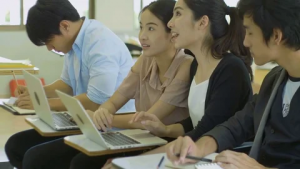
[Vecteezy]
In polytechnic and university, group work or group projects are emphasised considerably. This is evident from a higher weightage and major projects like Final Year Project (FYP). After all, it is known to benefit students’ learning (which I will explain later on).
But it seems that group work has become dreaded among students despite its many boons. To the point where some students choose to go to Junior College (JC) instead of poly in favour of fewer group projects.
Could group work be doing more harm than good for our students?
Why Have Group Work?

[iStock]
Group work is known to reflect students’ ability to work with others, think critically and problem-solve. It also improves their academic, and Social and Emotional Learning. Here are other ways students benefit from group work:
Improve teamwork skills
In group work, students have to collaborate with their group members to complete their tasks. This tests their communication skills, discussion skills, and active listening. They also learn to be flexible and adaptable to others’ schedules and working styles.
Enhances learning
Group work creates opportunities for students to problem-solve and facilitates learning. Studies show that group discussions lead to better memory recall and learning. This is because it helps students to process information and apply it practically.
See new perspectives
“Two heads are better than one” applies to group work. This is evident from group discussions where students get to share their opinions and perspectives. During these discussions, they also develop their reasoning skills by exchanging feedback.
Disadvantages of Group Work

[Adobe Stock]
Despite the many pros that group work offers students, it can also hinder their learning. This is especially so in unfavourable circumstances like major group conflict or when there are members who don’t show up or don’t contribute.
Unequal participation

[Blogspot]
Sometimes, there is unequal participation. This is where students end up with group members who don’t participate or don’t contribute to the group project. This could be by not being present at meetings or not completing their assigned tasks.
This means that other members have to pick up the slack, which:
1. Increases their stress levels
2. Makes discussions less effective
3. Causes conflict within the group
4. Lowers the group grade
Presence of conflict

[iStock]
Although overcoming conflict is an integral part of group work, if not handled well, this conflict could negatively affect students.
Studies show that the presence of conflict can:
1. Inhibit students’ individual learning
2. Increase stress levels
3. Cause students to fear conflict (conflict avoidance)
4. Affect students’ relationships
Affects students’ learning

[Pond5]
Students all have different learning speeds and styles. However, when working together on a group project, students are made to adapt to others learning styles and speeds. This might hinder their own individual understanding.
For example, a student might need more time to understand the content compared to their group mates. But because they have to work with their group, they’re forced to learn faster. This means that they have to rush their learning, making it less effective.
How to Make Group Work Conducive?

[Freepik]
To make sure that students benefit from group work, teachers and tutors must ensure that group work is conducive. Here are some ways to do that:
Encourage self-reflection

[iStock]
After every group project, teachers and tutors should encourage self-reflection. Students then analyse their behaviours, their learning experience and areas of improvement.
This encourages students to take charge of their own mistakes and learning. It also helps students to understand their strengths and weaknesses.
Allow peer appraisal

[The Motley Fool]
Teachers should allow students to appraise their group mates. Sometimes, students ride on others’ coattails because they’ll still get the same grade even if they don’t contribute. This leads to unequal participation and contribution.
By allowing students to appraise each other, they get to even out the grade according to each others’ participation. Those who contributed and participated the most get a higher grade, and those who don’t get a lower grade.
Include a component for individual work

[iStock]
Including a component for individual work gives students some control over their grades from the group project. This increases their sense of responsibility and students are more likely to participate.
Here are some ways teachers can include individual work in group projects:
1. Add a reflection component.
2. Create an individual assignment based on the group project. For example, a second assignment where students analyse the group project.
Conclusion

[iStock]
Group work can be a stressful but fulfilling experience for students. But there are times when group work hinders students’ development because of the stresses and conflict they face.
This is why it is important to make group work conducive and allow students more control in a group setting. Let us know in the comments if you think that group work benefits or hinders students’ development!
